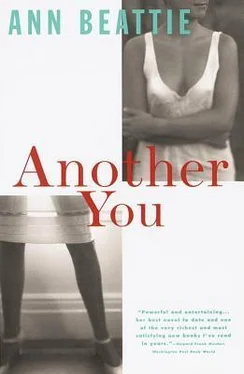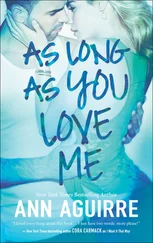Ann Beattie - Another You
Здесь есть возможность читать онлайн «Ann Beattie - Another You» весь текст электронной книги совершенно бесплатно (целиком полную версию без сокращений). В некоторых случаях можно слушать аудио, скачать через торрент в формате fb2 и присутствует краткое содержание. Год выпуска: 2014, Издательство: Vintage Books, Жанр: Современная проза, на английском языке. Описание произведения, (предисловие) а так же отзывы посетителей доступны на портале библиотеки ЛибКат.
- Название:Another You
- Автор:
- Издательство:Vintage Books
- Жанр:
- Год:2014
- ISBN:нет данных
- Рейтинг книги:5 / 5. Голосов: 1
-
Избранное:Добавить в избранное
- Отзывы:
-
Ваша оценка:
- 100
- 1
- 2
- 3
- 4
- 5
Another You: краткое содержание, описание и аннотация
Предлагаем к чтению аннотацию, описание, краткое содержание или предисловие (зависит от того, что написал сам автор книги «Another You»). Если вы не нашли необходимую информацию о книге — напишите в комментариях, мы постараемся отыскать её.
Another You — читать онлайн бесплатно полную книгу (весь текст) целиком
Ниже представлен текст книги, разбитый по страницам. Система сохранения места последней прочитанной страницы, позволяет с удобством читать онлайн бесплатно книгу «Another You», без необходимости каждый раз заново искать на чём Вы остановились. Поставьте закладку, и сможете в любой момент перейти на страницу, на которой закончили чтение.
Интервал:
Закладка:
All his life, Marshall had connected rain with death.
20
JANET LANIER’S VOICE, when she answered the phone, was weary. “Jack McCallum’s friend. My daughter’s teacher. Right,” she said. In the background, children’s voices shouted responses to something on TV. “Do you have children yourself?”
“No,” he said.
“I don’t suppose you need to be a parent to be a teacher,” she said. “Teaching at Benson College — is that like teaching children or teaching adults? I understand you do have a wife,” she added. When she slurred the word “understand,” what he understood was that Janet Lanier was drinking. Then he heard her sip from her glass. One of her children raising his voice to her, or to someone else. A door banging. “Jack isn’t here,” she said. “As to how you can get in touch with him, I’d say to call Lexington information and ask for Lenore Brighton’s number on Pine Street. That will get you my cousin. I don’t think they’d have a phone. Maybe you can persuade Lenore to go across the street and knock on the door.”
“I’m sorry?”
“You don’t know?” Genuine surprise was mixed with her weariness.
“He left the motel before I woke up. He left a note saying he was going to your house to talk to you.”
“Ah,” she said. On the TV, someone got off a round of gunfire. Then: “So he did.”
He listened to the confusion of her house, as if, by focussing, he could sort through that and determine whether she might have said what he thought she’d said. He could almost see it: the children, excited, taking the opportunity of Mom’s being on the phone to act up, quarrel, change channels, slam doors.
“I would never have recognized him,” she said. “Handsome Jack McCallum. Now he’s underfed and has such a haunted look. I think he’s haunted himself, if you know what I mean.” She put her hand over the phone, spoke inaudibly to whoever was speaking to her. “His injuries are quite serious, though I could have done without seeing the gash in his side.” She cleared her throat. “Would you like to come over?” she said. “Might as well talk about this face-to-face.”
He looked at the highway. Across the street was a discount boot store. A large pink neon boot repeatedly kicked a falling star. Next to that was a liquor store with an unlit neon sign of a huge martini glass tipped almost on its side. At the base of the sign was a tangle of pink and orange bougainvillea. “I’m in Islamorada,” he said.
“Then I guess you wouldn’t like to come over,” she said. “I don’t find that many people do come over, including my husband.”
Marshall decided to ignore that remark. It was as if flames leaped from it. “He said he’d known you years ago at camp,” Marshall said hollowly.
She laughed. A small dry laugh, or a cough — he couldn’t be sure.
Why was it, he wondered, that involving himself in any aspect of McCallum’s life always made him perplexed and vulnerable? “Perplexed” was too mild a word. He was so shocked by McCallum, so often, that now he was trying to quell his reactions by downplaying what his emotions really were. Yet again, McCallum had omitted significant information. He and Cheryl were together, in Lexington, Virginia. This was what Cheryl’s mother had just said, surely it was what she had just said. He looked at the ground, at the asphalt strewn with dropped blossoms and crushed cigarettes. Across the highway, the star descended toward the boot’s pointed toe. He was standing at a phone outside a seafood restaurant in Islamorada.
“I won’t keep you,” he said. “If you see him, tell him I called to see how he was doing,” he added lamely.
“Did you think I might be having them to Sunday dinner?”
“Excuse me?”
“Jack and Cheryl. Did you think I might roast a chicken and have them for Sunday dinner?” She covered the receiver again, but this time her words were audible: everyone in the room was going to go straight to bed if there was any more fighting over Nintendo. He imagined her there, stuck in the chaos of her life, a woman who had just gotten the information that her ex-boyfriend from about thirty years ago was now her daughter’s lover. “Hang on. I have to switch to the extension,” she said.
As he waited, he thought of hanging up. He was embarrassed that he was both too shocked and too curious to do it. What a story he would have to tell Sonja when he next spoke to her. He could imagine no way to tell her this on the phone.
“Hang it up, Richard,” Janet Lanier hollered.
The phone was hung up. When she spoke to him, the absence of background noise was stunning, almost surreal, like trees becoming still in the wake of a storm.
“I assumed you knew. Cheryl said you knew she’d been raped — how would she not have told you about her great savior Jack? Did you know Cheryl had been raped?”
“She told me,” he said.
“By one of the nicest people, I thought, I’d ever known. I have to believe her. I wish she’d said something at the time. But now I find that I was the last to know.” She cleared her throat. “Of course, I have to believe her,” she said again.
It was incredibly perplexing. So Cheryl had known McCallum all along? Known him when Livan Baker made her accusation? Known that he had come to be with her the night she came into Dolly’s restaurant, and that was why she was so troubled when she discovered both that Marshall was present and also that he meant to contact her mother? McCallum had instigated this trip knowing he’d jump ship in Virginia. Why hadn’t he just flown there? Why had it been necessary to involve him, to mislead him by saying the rendezvous with Cheryl was for his sake, too?
“You knew that he arranged financial aid for Cheryl, didn’t you?” Janet Lanier said. “All those years we kept in touch, and he was so helpful. So ‘supportive,’ I believe the current term is. He sent me so many letters years ago. Do you know, I began to fantasize we’d get together when he finished college. We’d get married, we’d have nice lust instead of backseat lust. All these years later, suddenly there’s Jack, standing in my kitchen. The two of them, come to set me straight about what I didn’t know. And the worst thing is, I forgive her. She’s foolish, but I’m stupid. Do you know what I thought as they stood there, my Cheryl so brazen, trying to change the conversation by blaming me for having her baptized and naming her a godfather, as if those things were the same as arranging to have her raped? I thought: He’ll stop at nothing. A boy from summer camp, who once taught me to swim. He used to stand out there in the water, hollering instructions, blowing his whistle, and then before we got out of the water he’d always do the same thing: the dead man’s float. He could hold his breath so long, we’d all race for him in a panic. I can still see him in the pond, not moving a muscle. Then he comes to Buena Vista and takes my daughter’s hand, claiming to be in love with her. Whatever she thinks she’s doing, I know he’s still doing the dead man’s float. What does he think he’s going to do to support her? He’ll have to take her back to New Hampshire. Is that what’s going to happen? Is she going to live with him down the street from you?”
“I don’t live anywhere near him,” he said. He was grateful that there was finally something he could say.
“A thought like this doesn’t even cross your mind. It reminds me that most murder victims know their murderer. Or is that an old wives’ tale? I think they know them, that they’re lovers or aunts or uncles or whatever they are. The same way so many people get broken bones from accidents right in their own house. People walk fine when they’re outside, then they slip in the tub. Have you heard this, or am I imagining it?”
Читать дальшеИнтервал:
Закладка:
Похожие книги на «Another You»
Представляем Вашему вниманию похожие книги на «Another You» списком для выбора. Мы отобрали схожую по названию и смыслу литературу в надежде предоставить читателям больше вариантов отыскать новые, интересные, ещё непрочитанные произведения.
Обсуждение, отзывы о книге «Another You» и просто собственные мнения читателей. Оставьте ваши комментарии, напишите, что Вы думаете о произведении, его смысле или главных героях. Укажите что конкретно понравилось, а что нет, и почему Вы так считаете.












